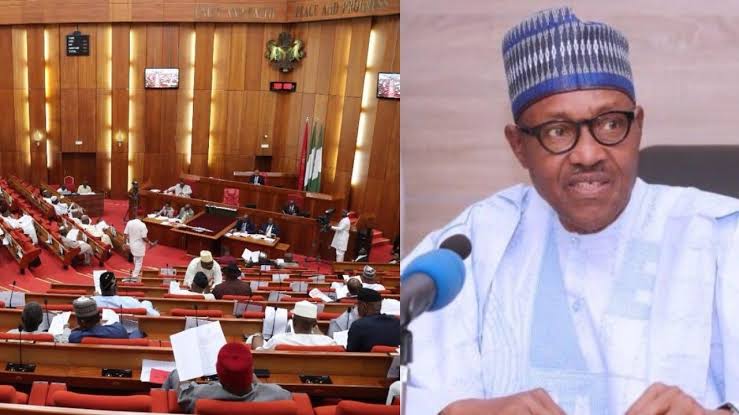NEWS
President Buhari demands revision of 2022 fiscal framework from Senate

The President, Major General Muhammadu Buhari (retd.), sent a request for approval of adjustments to the 2022 fiscal framework to the Senate on Tuesday.
Buhari, in the letter, dated 5th April 2022, read during plenary by the Senate President, Ahmad Lawan, explained that an adjustment to the 2022 fiscal framework became imperative in view of new developments in both the global and domestic economies.
He insinuated that, the developments were orchestrated by spikes in the market price of crude oil, which were a fallout of the Russian-Ukraine war.
The letter read, “As you are aware, there have been new developments both in the global economy as well as in the domestic economy which have necessitated the revision of the 2022 Fiscal Framework on which the 2022 Budget was based.
“These developments include spikes in the market price of crude oil, aggravated by the Russian-Ukraine war, significantly lower oil production volume due principally to production shut-ins as a result of massive theft of crude oil between the production platforms and the terminals.
“The decision to suspend the removal of Petroleum Motor Spirit subsidy at a time when high crude oil prices have elevated the subsidy cost has significantly eroded government revenues.”
He, therefore, requested for an increase to US$73 per barrel from US$11 per barrel in the oil benchmark by upper chamber.
The President also demanded for a reduction in the projected oil production volume from from 1.883 million barrels per day to 1.600 million barrels per day.
The chamber was also asked by the President to approve an increase in the estimated provision for PMS subsidy for 2022 by N3.557 trillion, from N442.72 billion to N4.00 trillion.
Muhammadu Buhari stated that reducing the provision for Federally-funded upstream projects from N352.80 billion to N152.80 billion is very necessary .
He proposed an increase in the projection for Federal Government Independent Revenue by N400 billion; and an additional provision of N182.45 billion to cater to the needs of the Nigerian Police Force.
He included that, “based on the above adjustments, the Federation Account (Main Pool) revenue for the three tiers of government is projected to decline by N2.418 trillion, while FGN’s share from the Account (net of transfer to the Federal Capital Territory and other statutory deductions) is projected to reduce by N1.173 trillion.”
He disclosed that the amount available to fund the FGN Budget is projected to decline by N772.91 billion due to the increase in the projection for Independent Revenue (Operating Surplus Remittance) by N400 billion.
He explained further that Aggregate Expenditure is projected to increase by N192.52 billion, due to increase in personnel cost by N161.40 billion and other service wide votes by N21.05 billion (both for the Nigeria Police Force), additional domestic debt service provision of N76.13 billion, and net reductions in Statutory Transfers by N66.07 billion.
He gave a comprehensive breakdown by saying, the net deductions would see a cut by N13.46 billion from N102.78 billion to N89.32 billion for NDDC; NEDC, by N6.30 billion from N48.08 billion to N41.78 billion; UBEC, by N23.16 billion from N112.29 billion to N89.13 billion; Basic Health Care Fund, by N11.58 billion from N56.14 billion to N44.56 billion; and NASENI, by N11.58 billion from N56.14 billion to N44.56 billion.
The President noted that the total budget deficit is projected to increase from N965.42 billion to N7.35 trillion, representing 3.99% of GDP.
According to him, the incremental deficit will be financed by new borrowings from the domestic market.































